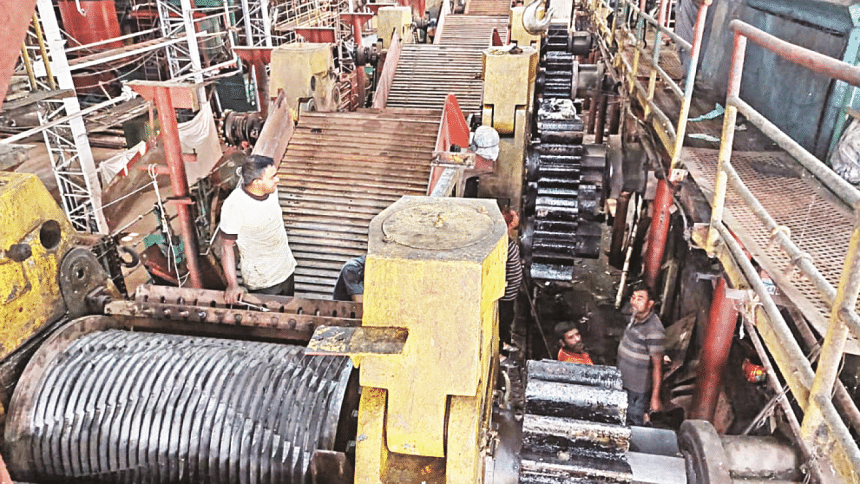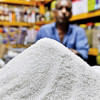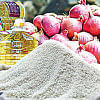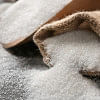State-run mills start crushing as sugar price jumps

State-run sugar mills have started crushing locally-grown sugarcane, aiming to produce 33,000 tonnes of sugar in the current fiscal year of 2023-24, said a top official.
The amount is 55 percent higher than the 21,313 tonnes produced by sugar mills under the Bangladesh Sugar & Food Industries Corporation (BSFIC) in fiscal year 2022-23.
"We have increased the production target as farmers are gradually increasing cultivation of higher-yielding sugarcane varieties," said Pulak Kanti Barua, joint secretary and a director of the BSFIC.
Beginning with the crushing of sugarcane at North Bengal Sugar Mills Ltd in Natore, production will gradually start at the remaining eight sugar mills by December 29 this year, according to a notification by the industries ministry.
The state corporation is set to increase production at a time when consumers are paying record-high prices to buy sugar.
Yesterday, the price of one kilogramme (kg) of sugar was around Tk 140-145 in Dhaka, about a 27 percent increase year-on-year, according to the Trading Corporation of Bangladesh.
Five private firms refine and market the product by importing raw materials to meet more than 98 percent of the country's annual requirement of about 20 lakh tonnes.
The state mills produced 24,509 tonnes in FY2021-22, showing that sugar produced by the BSFIC mills met only 1.65 percent of the total requirement.
Barua said this year a total of 5,86,000 tonnes of sugarcane would be harvested, which was much higher than the 3,83,000 tonnes of sugarcane grown last fiscal year.
However, he said, the farmers cultivated sugarcane on around 43,000 acres of land this year compared to 49,000 acres last year.
Although acreage declined, production increased this year due to the use of high-yielding seeds and intensive care by the BSFIC, including the application of fertilisers and proper irrigation of sugarcane fields, he said.
Barua said farmers would gradually come back to sugarcane cultivation once they realised that high-yielding sugarcane was profitable.
According to him, high-yielding sugarcane seeds are collected from the Bangladesh Sugarcrop Research Institute (BSRI).
Barua said the BSFIC set a target to produce 50 tonnes of sugarcane from each acre of land, up from a maximum of 20 tonnes at present. He added that they were providing instructions and training on the use of high-yielding seeds as well as modern cultivation systems.
The BSFIC even introduced contract farming in cooperation with a multinational company working in Bangladesh to ensure higher production of sugarcane, he said.
Meanwhile, the BSFIC has increased the price of sugar to Tk 125 per kg, up from Tk 105 per kg last month.
The corporation distributes the sweetener through 2,500 dealers across the country, with each dealer getting just 500 kgs annually.
Besides, the BSFIC has to provide a supply of sugar to some government institutes immediately after refining the product at the beginning of the year.
After distributing sugar to the government agencies, they distribute it to the dealers in phases.
Currently, just nine of the 15 sugar mills under the BSFIC are operational as the government closed six of them in December 2020 on the grounds that they were continually incurring losses and thereby required modernisation.
Shahjahan Ali Badsha, Bangladesh Sugar Mill Sugarcane Farmers Federation, said it was a profitable business as the sugarcane seeds provided by the BSFIC were yielding twice as much as traditional seeds.
He added that it was yet to gain popularity among farmers as they were unaware of the output of high-yielding seeds and because they could cultivate other crops at a lower cost.
However, other crops may cause losses to farmers in the case of drought or heavy rainfall or if prices go down, but sugarcane growth is not hampered by drought or heavy rainfall and prices remain stable, he said.
He also said the BSFIC has increased the price of sugarcane to Tk 140 per maund (around 37kg) from Tk 120 per maund this year.
Against this backdrop, high-yielding sugarcane is profitable and acts like insurance if other crops are being grown, he said.

 For all latest news, follow The Daily Star's Google News channel.
For all latest news, follow The Daily Star's Google News channel. 








Comments